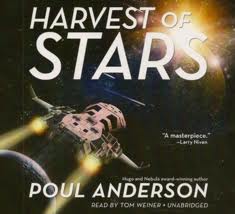Originally published on Poul Anderson Appreciation, 11 August 2012.
In
his History of Technic Civilisation, Poul Anderson imagined abundant
galactic life, including planets where human beings could breathe and
walk without having to transform either themselves or the environment
first. His Harvest Of Stars (New York, 1993) has the opposite premise. Life is rare and cosmically insignificant until it spreads from Earth.
When
human personalities have been downloaded into artificial neural
networks, then carried at near light speeds across interstellar
distances, then one download directs terraforming even of an initially
lifeless planet while others are incarnated in newly grown human bodies.
Thus, a single personality:
"...won't ever have to
end..." but "...can have life after life, on world after
world...Bringing life to the universe..." (p. 528)
Life
triumphs against all the odds. Despite inhospitable environments, the
light speed limit and the impossibility of transporting many human
organisms across long interstellar distances, the downloads will spread
organic life throughout the stellar universe whereas the Solar
"sophotects", self-evolving artificial intelligences incorporating human
minds but not independent downloads, endlessly refine their own
inorganic intelligence, contemplating pure mathematics instead of the
material universe.
It follows that the sophotects were
wrong to think either that life was insignificant or that their theory
enabled them to model all its possible forms. The leading download,
Anson Guthrie, has:
"...a gut feeling that the universe isn't as lifeless as the sophotects on Earth claim." (p. 508)
But
the universe, or what we see of it, was lifeless until Guthrie and his
companions started to remake it, perhaps the ultimate achievement of
Andersonian characters.
Olaf Stapledon had anticipated Anderson's download-sophotect dichotomy. In his future history, Last And First Men,
successive human species inhabit Earth, Venus, then Neptune. Later
species can direct evolution, thus create their successors. Some Third
Men, valuing intellect, create, as the Fourth Men, disembodied,
artificially maintained Great Brains, like conscious organic computers,
which become hostile to organic life but which eventually realise that
their merely cerebral understanding is frustratingly limited because
they themselves lack insight into values and that they in their turn
must be replaced by normally constructed though thoroughly perfected
Fifth Men with brains as large as possible though no larger in a bipedal
form. Unfortunately, however, Anderson's sophotects never do realise
the limitation of their own merely intellectual approach. Consequently,
conflict between them and free human beings continues throughout the
Tetralogy, of which I have started to reread the second volume, The Stars Are Also Fire.

No comments:
Post a Comment